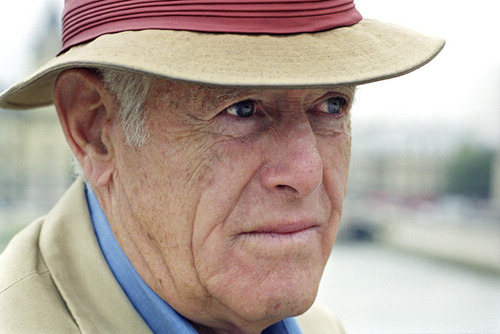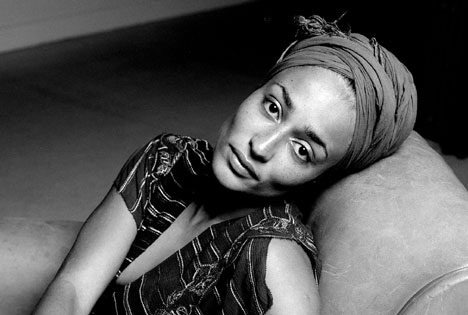
A Survey of Writers on Contemporary Writers
Listening to writers read and discuss their work at Newtonville Books, the bookstore my wife and I own outside Boston, I began to wonder which living, contemporary writers held the most influence over their work. This survey is not meant to be comprehensive, but is the result of my posing the question to as many writers as I could ask.
JAMES SALTER

© Ulf Andersen
SARAH BRAUNSTEIN: In my early twenties,I found James Salter. I read Light Years holding my breath, read lateinto the night, immersed in the glamour and sorrow of the story. How did hemanage to marry such cutting intensity with languid, delicate prose? I wasstunned by his precision. By that mercilessly roving point of view. My copy is
waterlogged and dog-eared and stained with coffee and spaghetti sauce. Opening
to a random page, I see a sentence I’ve underlined:
“His
uncombed hair was splitting at the end. It was also thinning, which pleased her
somehow, as if he had been ill and she would see him regain his strength.”
And this one:
“Kate shrugged. She had the languor of a
delivery boy, of someone who could not be hurt. She had lived through unheated
bedrooms, unpaid bills, her father’s abandoning them, his returns, beautiful
birds he had carved out of applewood and painted and placed on her bed.”
The whole book feels strangely throwaway, casual… light
on the page, even when its subject is death, the failures of love, the
disintegration of family. There’s an ease to the prose, an ease I feel even in
the most far-reaching metaphors. This was something I wanted—I want—to
reproduce. I wanted—want—to write like this. To see like he does. And so
I tried to be looser on the page. I willed myself to take risks with metaphor.
Take this passage, circled and starred:
“The book was in her lap; she had read no
further. The power to change one’s life comes from a paragraph, a lone remark.
The lines that penetrate us are slender, like the flukes that live in river
water and enter the bodies of swimmers. She was excited, filled with strength.
The polished sentences had arrived, it seemed, like so many other things, at
just the right time. How can we image what our lives should be without the
illumination of the lives of others?”
Exactly.
NIC BROWN: For many years I worked as a musician. As a teenager,
one of my favorite places to see a band was a place called the Cat’s Cradle, a
storied rock club on the edge of Chapel Hill, North Carolina. I was thrilled
when my own group was finally booked to play our first show there. I arrived
early and went backstage, only to find that it—a true reservoir of teenage rock
dreams if there ever was one—was little more than a long storage closet with
graffiti-covered plywood walls. I remember almost nothing else about the show.
What do
I remember, though, is returning to the Cat’s Cradle a few weeks later to see
another band perform. I don’t remember who they were. What I remember is that
when they came on stage, the usual thrill I felt at the emergence of any act—the
swell of magic surrounding the performers—wasn’t there. Poof. I knew what the
backstage looked like now, I knew just what their soundcheck had been like, I
knew they probably ate dinner at the pizza place next door. And just like that,
the mystique was gone.
I’m a
writer now, and often I feel a similar diminution in magic when I read. As I
scan a page, I can envision the laptop it was composed on, I chart out
narrative arcs like passages on a map, I sense the author’s stolen hours, I
feel their tricks of information withholding and disclosure. My awareness of
process and its resultant demystification of art, of course, places a heavier
burden on the art itself and is a good perspective for any writer to have. But
I’d be lying if I said I don’t miss the easy magic that once came from almost
any performance, or rose from just about any page I read.
The more
I think about the work of the author James Salter, however, the more magical it
becomes for me. I can envision him at his desk, sure. I can just about graph
out the plots to his novels by memory. I’m close with a friend of his, I’ve
seen interviews with him. But the more I think about his work, the more I know
about its creation and creator, the more I’m mystified and beguiled.
Let’s
look at my favorite Salter novel, Light
Years. The tale of a marriage falling apart. The porous and flexible use of
point of view in it—shifting between characters not only for different
chapters, but sometimes in the same paragraph—is exactly the sort of thing I
warn writing students against all the time. Same with his treatment of tense,
which shifts between present and past seemingly at will. The opening pages alone
start in first person plural— “We dash the black river…,” as if
part of some elegant stage direction—then shift to third person limited. On one
level I have the question, “How did he just pull that off?” On
another I ask myself why I even bother asking.
Sometimes
I see myself writing towards finding out what I’m writing about, my narratives
just explorations of my own true intentions. I don’t feel this about Salter’s
prose. He seems to know, with such confidence, what is at the core of what he’s
writing about and can thus write around it from any perspective or tense he
wants. His work is often described as impressionistic, but I think the more apt
painterly analogy would be cubist—a succession of scenes told from multiple
angles at once.
But that
too is not quite right, implying some Rashomon-type
fracturing, which Salter doesn’t exactly evoke. Again, the more I try to pin it
all down, the more it seems to recede from me.
It seems
only fitting that I found Salter through Darren Jessee, a songwriter and the
drummer for Ben Folds Five, one of Chapel Hill’s most successful bands—one that
I saw a handful of times at the Cat’s Cradle, in fact, and who used to evoke
such magic for me on stage. They don’t anymore. Nothing against them, not many
acts do. Unsolicited, Darren brought the book to my door one day and just said
I had to read it. It was like he was an emissary from one art form to another,
delivering magic to me in a paperback.
GEORGE SAUNDERS

© The Guardian
RYAN BOUDINOT: I found in the work of George Saunders a guy who
recognized a certain ersatz Americana populated by characters who expressed
what I felt at the time. Especially in the earlier stories, his characters were
consistently shat-upon, trapped in absurd jobs where the tyranny of the
management was never quite justified given the low-stakes or bullshit nature of
the actual work. I just had a group of students read “The 400-Pound
CEO,” which I was fortunate to discover when it came out in Harper’s
magazine in the early/mid-‘90s (I’m bragging in a
I-was-into-that-band-when-they-played-clubs kind of way here.) The story still
holds up beautifully, and I was impressed again by Saunders’s capacity to seize
opportunities that other writers might let pass by. There’s no such thing as a
minor character in his work. Every character has some hilarious problem or
issue they’re contending with, like the Tourette’s-suffering waiter at a
restaurant or the babysitter who is going through her grade school yearbook
with a highlighter. I love how George Saunders’s work encourages us to be
interested in people in all their beautiful and fucked-up glory.
CHRISTOPHER BOUCHER: No contemporary writer has influenced me more—both
personally and professionally—than George Saunders. I first came across his
work in college, when a friend of mine played me a tape of George reading his
story “The 400-Pound CEO” during a long car trip. I’d never heard another story
like it, and it was the first piece of fiction that I can recall which captivated
me at a sentence-level. I’d understood style as a concept before that point,
but I (naively) thought of it as a sort of syntactical signature. When I read
George’s work, I began to understand style as the unique qualities of that
author’s linguistic inquiry—a facet of the prose which runs parallel, and
organically informs, the characters’ trajectories. The heroes in George’s first
collection, CivilWarLand in Bad Decline,
then, seem doubly-doomed—not only are they in bad situations (working in an
absurd environment, suffering from terrible guilt or loneliness), but many of
them struggle to express themselves within the confines of an exaggerated,
hyper-PC lexicon. In my opinion, then, many of the characters in this book are
trapped—and sometimes freed—by language itself.
This is
not to overlook the other accomplishments of these stories—their hilarity, say,
or their heartbreaking and enlightening crescendos. I’ll never forget the first
time I read the end of the story “CivilWarLand in Bad Decline,” for example,
when the spirit of the first-person narrator, who’s just been murdered, sweeps
into the body of his murderer, Sam.
George writes, “I see the
man I could have been, and the man I was, and then everything is bright and new
and keen with love and I sweep through Sam’s body, trying to change him, trying
so hard, and feeling only hate and hate, solid as stone.”
When I
read that moment, which I found both unpredictable and exactly right for the
story (especially given the despair in the phrase “hate and hate”), my feet
welded to the floor and a hatch opened in my mind and I felt wind on my brain.
A few
years later, I was lucky enough to study with George in the MFA program at
Syracuse University, and I discovered that he’s as good a person, and as gifted
a teacher, as he is a great writer. This might seem like an afterthought, but
in fact I think it’s central to George’s influence—on me and, I suspect, a
generation of writers. George’s teaching and writing seem driven by the same
qualities: a deep sense of awareness, compassion and humility. There’s no
writer who I admire more, and to whom I’m as indebted.
MAILE CHAPMAN: The first writer who treated my own (embarrassingly
self-indulgent) stories with seriousness, the writer who taught me the most
about how to really read and understand the nature of my own work, was George
Saunders, who was my thesis advisor in the MFA program at Syracuse. There are a
lot of writers who I’m sure will list George high as an influence, whether they
worked with him in person or not, and I think a lot of that is because he is so
distinct and so intellectually generous as a writer. He takes the risk of being
funny and emotionally deep at the same time, while allowing the reader to feel
smart enough to get what’s going on without being pandered to. One of the very
valuable things he imparted to those of us who studied with him was the
importance of finding your own objectives, your own material and scope and
style. He drew a bunch of mountain peaks on a whiteboard in class one day and
said that they represented all of the literary titans whom he had read in
formative times, from the Russians to Hemingway and Carver et al, big distinct
voices, and he said he had despaired of ever trying to do anything even
remotely like what they had done, and that this could be paralyzing. Then he
said he felt much better when he realized that he didn’t have to even think
about this too much because his project as a writer was to do his own thing,
whatever it was, and then he drew a little lump between some of the mountains
and said that this was his hill, and he was happy with it. So now when I fill
my own whiteboard with influential mountains, his is one of them and I can be
happy with my little lump in the background. He taught me and others a lot
about the craft of writing but also about how to live as a writer, how to
consider our work and our lives and how to approach the whole endeavor with wit
and humility and a good work ethic totally apart from the angst of too much
contemplation of measuring up to anything.
ARTHUR PHILLIPS: When I was getting started, I noticed how many of
my contemporaries mentioned the same influences of the generation just before
ours: Pynchon, DeLillo, Roth, Updike, Munro. I heard these names so often that
I consciously decided not to read them for a while.
When I
did get to them, I was surprised to find how much I liked them and how much I
felt in sync with some of their goals and styles. I am thinking specifically of
Pynchon, Roth, and DeLillo here. I just finished “The Crying of Lot
49” last night, for example, and felt very connected to it in some ways:
as a nonsense, as a historical inquiry, as a plot of conspiracies, as a refusal
to do the expected thing, and yet also for its characterizations/caricatures.
George
Saunders, whom I admire enormously, does this awfully well, too, and seems an
heir to Pynchon, for example.
JIM SHEPARD

© Jerry Bauer
WESTON CUTTER: Jim Shepard said (in 2010, during the Q+A about his
guest-editing of Ploughshares)
“Stuff that can’t be pinned down by a historian can be pinned down by a
fiction writer.” The video the quote comes from is sort of strange: the
questions are silenced, but Shepard’s answers are (obviously) at volume, so one
can only assume the Q Shepard was A-ing had to do with his fondness for and
mastery of fiction which is grounded in actual historical settings. Another
thing he said was “I’ve often chosen people who…there are places where
nobody knows what happened during those moments.” Shepard’s written novels
and short stories, though as of 2013 his most recent several books have been
story collections and he’s admitted an increasing fondness for and tendency
toward the “guerrilla tactics of the short story” instead of the
“massed armies deployed by the novel.” After the above quote about
nobody knowing what happened to someone during some moment, Shepard talked
about F. W. Murnau, a legendary German silent-film director (he directed Nosferatu) who, during World War I,
crashed his plane (“I don’t know if you’ve ever seen a World War I
aircraft, but it’s essentially like a chicken coop with an engine on it.”)
in Switzerland, directed an opera company, and, from that, began his directing
career.
Here’s another thing he said at that silent-Q+A:
“One of the good things about fiction is that you can fill in the
gaps.” What Shepard meant was that, in the case of Murnau, perhaps there
was more to the story of the man’s plane crash and eventual leading of an opera
than what had been uncovered by historians. This sounds fundamentally dry to
talk about in this way, but what Shepard does with more verve and glory than
just about anyone is not simply fill in the gaps—lots of folks are skilled at
filling in gaps, from inveterate liars to six year-olds to daydreamers—but he
is able to identify gaps that may be interestingly, satisfyingly filled in.
Ultimately, of course, most of us come to fiction for an
experience of other, for that
glorious whisper, that voice in our head of another person’s experience and
existence. At this, Shepard’s as good as absolutely anyone—here for instance is
the start of his glorious “Trample the Dead, Hurdle the Weak” from
2007’s Like You’d Understand, Anyway:
“Guy’s hurt? Fuck ‘im. Guy can’t get up, play’s still going? Run his ass
over. Whistle’s blown? Stretcher bearer time. Grab a blow and let the Sisters
of Mercy do their thing.” This example’s included simply to make clear
that while Shepard’s most striking skill is not remotely his only skill: guy gets character as well
as the best of them.
Still there’s this other thing, the settings Shepard
situates his phenomenal characters within. What, for instance, might’ve life
been like for one of the engineers at Chernobyl when it exploded in April of
1986? For many of us, the answer likely would include a sort of Tom Clancy-ish
pace and feel: there’d be alarms and mayhem and grim attempts to fix what’s
been broken, yet Shepard, in his “The Zero Meter Diving Team,” brings
Boris Yakovlevich Prushinsky—brother to one of the Chernobyl engineers—to total
life without making a nuclear
meltdown the center of attention. Imagine that. Imagine writing about
significant historical moments without defaulting into a sort of hyped
news-speak. Imagine resisting the temptation to fall back into and rely upon
the fireworking actual events instead of creating, despite or within the
heightened scenario, fiction which features the same necessary elements as all
great fiction shares.
After enough time with Shepard’s work, you realize he may
be working in a new furrow of fiction: not magic realism, but a
magic-of-realism. He creates and exposes the amazing, powerful aspects of the
stuff we’re surrounded by (stuff, incidentally, many of us turn to fiction to
escape or be soothed by). I don’t doubt the details of the Dutch Water Defense
are fascinating, but I wouldn’t have imagined I’d’ve felt moved by a fiction
set in that milieu. One wants to not make too big a deal of what Shepard is
doing: he is, after all, simply making hugely compelling fictions populated
with real-as-blood characters. That he happens to set quite a few of those
fictions in scenarios which reveal a magic we may otherwise overlook seems like
almost a lesson, something about attention, something about being able to sense
and explore gaps—in our own lives, in the lives of everyone around us—we may
not take enough note of.
BRUCE MACHART: Jim Shepard is the funniest man alive. I mean it.
On the two occasions I’ve been lucky enough to be in his company, I’ve
left with a diaphragm so sore from laughter than I had trouble rising from bed
the next day. And his stories carry that
humor in them, but they carry it toward such heart-shattering seriousness. I’m in awe of his ability to make us laugh
until we cry…or to laugh when we know we shouldn’t be.
LAURA VAN DEN BERG: Jim
Shepard showed me that you don’t have to stay in your own backyard.
GARY SHTEYNGART

ALEX GILVARRY: Gary Shteyngart was my teacher in the second fiction
workshop I ever took. This was at Hunter
College in 2002, and Gary had just published his first novel, The Russian Debutante’s Handbook. Until
then, I didn’t know one could write novels for a living. In my young and naive
mind all the great writers were dead. I thought of myself as a serious reader,
but contemporary novels were something I ignored altogether. Perhaps this is
not uncommon for a twenty-year-old college student. Suddenly here was this guy
who was writing the kind of fiction I wanted to read. Gary was the first example I had of a
contemporary writer, and his influence on my work was immense. I saw how one
could be funny on the page and still make you feel a deep sadness. I became
aware of voice. I studied voices. I began experimenting with big, loud voices
in my early stories. Narrators that would humor me. This was the type of
fiction I wanted to write.
ZADIE SMITH

© tetw.org
CARLENE BAUER: Back
in 2000, at three years older than her 24, I was afraid of Zadie Smith. You
remember the gaze in the author photos; you know what I’m talking about. Bugger
off, it said, I’m trying to think. You remember that thing she said
about her own novel, too, how she disparaged it by calling it “the
literary equivalent of a hyperactive, ginger-haired, tap-dancing 10-year-old.”
Who at 24 could have enough trust in her talent to knock her own work in
public, even if she performed that disavowal with her tongue in cheek? It
suggested she knew there was more where that came from, so why be precious
about this first? In short: she was brilliant and beautiful, and didn’t seem to
give a crap. Or have feelings that you could hurt.
But my fear gave
way to joy while reading the book, because White Teeth was fantastic. It
merited the fuss, when hardly anything ever did. Finally, I thought, a young
woman who could match all the lauded young dudes—Wallace, Eggers, Antrim,
Moody, etc.—for energy, intelligence, and ambition. And those sentences, which
came on like blasts from a gleefully wielded fire extinguisher. This girl—but
you couldn’t call her a girl, because that would be like putting pink booties
on a tiger, and I was pretty sure she’d never needed to cling to Sylvia Plath
for inspiration on the voyage out. This person, then, would keep
writing, and she would be with us for a long time. It was exciting to be
present for the arrival of such a phenomenon.
She grew up, and I
grew up, and thirteen years later, I am no longer afraid of Zadie Smith. It
turns out she is human—and an unabashedly female human at that, one who happily
and freely opines on that ever-changing, ever-baffling state when she is not opining
on everything from Facebook to ordering takeout. It turns out she did cling to
Sylvia Plath on her voyage out, and apparently has a love for the novels of
Marian Keyes, one of the foremost practitioners of chick lit. Who knew? And:
that turban. David Foster Wallace had his bandanna; she has that. I can’t lie:
it’s a dash of panache that makes me even more fond of her. Bugger off,
that turban says. I’m an adult lady with a podium to get to. Speaking of
which: she’s no longer afraid of being in the public eye, it seems. She has
taken up the role Joan Didion, Elizabeth Hardwick, and Mary McCarthy used to
play, writing criticism and fiction, speaking with authority of her moment. And
she is taking that role into the 21st century without hiding behind
the Internet.
I admire and am
grateful for Zadie Smith, for her work and her person, both of which are very
funny, and very wise. It’s not easy to be very funny and very wise at the same
time. In America we require that writers be one or the other, but Smith is British,
and the British, from Chaucer to Austen to the Amises and beyond, have had no
trouble integrating the comedic into the literary, or accepting the comedic as
literary. As a former English major who has been shaped by the criticism and
novels of Forster and Woolf, as a writer who has written both fiction and
criticism, I have also been compelled by Smith’s own wrestling with these
influences. Her love of the city that made her, and the people in it—this too
compels. She is outward-looking, forward-facing. Only connect, Forster
famously said, and even if I sometimes roll my eyes at this amorphous, naïve,
shopworn injunction, all the same I believe in it, I believe in it. Smith does
too. “I like people,” she recently told an interviewer, “so I like to be around
them one way or another.” All her books bear this out. She writes dialogue
expertly because of it. Many of us who write struggle to balance our warring
desires for society and solitude, so it’s no mean feat when one of us can
actually like people—like being around them—but can also retreat from them
gracefully, without defiance, in order to write about them convincingly and
memorably. For the last few decades, it’s been fashionable to write fiction in
which language, not character, is demonstrated to be the author’s great love.
But Smith takes equal care with both.
MEGAN MAYHEW BERGMAN: Like many, I found Zadie Smith through White Teeth,
a novel I read and re-read with the zeal of a fawning college student. But
after teaching her essay collection at Bennington,
my admiration increased; the intellectual heft behind her creative work
inspires me, and also my students. Upon reading it I think: this is what a
well-rounded, hard-earned life of letters looks like. Here is someone who
thinks not just about her contract or publicity, but about the novel itself,
what it can accomplish. Here is someone who makes genuine, high-value
contributions to literature, both fictional and critical.
I grabbed NW in an airport the week it was
published. The novel made me work, and it gave me great pleasure; it’s an
ambitiously-imagined, magnificently executed novel on class, opportunity, and
the way place shapes us. Smith’s novels are always rich, saturated, and
real—but never overly tidy. In her essay On Reading Nabokov and Barthes,
she writes: “The novels we know best have an architecture. Not only
a door going in and another leading out, but rooms, hallways, stairs, little
gardens front and back, trapdoors…” I admire, so much, the way her structure,
style, and characters honor complexity.
It is a gift for any woman writer to watch another female
novelist own her power, and to do so with grace and candor. As a mother, I
benefit from Smith’s honesty about her internet addiction, the challenges of
managing children and writing time, but also her adamant stance that the “idea
that motherhood is inherently somehow a threat to creativity is just
absurd.” So as I fumble on, trying to string together sentences with the
howl of a dog or the sound of my daughters’ crying in my ears, I often think of
Smith’s notion that “the subconscious is a great organizer of material.”
–
Sarah Braunstein is the
author of the novel The Sweet Relief of
Missing Children
Nic Brown is the author
of the novels In Every Way, Doubles, and
Floodmarkers
Ryan Boudinot is the
author of Blueprints of the Afterlife,
Misconception, and The Littlest Hitler: Stories
Christopher Boucher is
the author of the novel How to Keep Your
Volkswagen Alive
Maile Chapman is the
author of the novel Your Presence is
Requested at Suvanto
Arthur Phillips is the
author of the memoir The Tragedy of
Arthur, and the novels The Song is
You, The Egyptologist, and Prague
Weston Cutter is the
author of the short story collection You’d
Be a Stranger, Too
Bruce Machart is the
author of the short story collection Men
in the Making, and the novel The Wake
of Forgiveness
Laura van den berg is the
author of Find Me: A Novel, The Isle of Youth: Stories, and What the World Will Look Like When All the
Water Leaves Us: Stories
Alex Gilvarry is the
author of the novel From the Memoirs of a
Non-Enemy Combatant
Carlene Bauer is the
author of the novel Frances and Bernard,
as well as the memoir Not That Kind of
Girl
Megan Mayhew Bergman is
the author of the short story collections Almost
Famous Women, and Birds of a Lesser
Paradise
Lettering by Caleb Misclevitz
–




